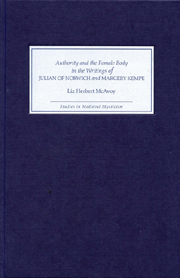Book contents
- Frontmatter
- Contents
- Dedication
- Acknowledgements
- Abbreviations
- Introduction
- 1 Motherhood and Margery Kempe
- 2 The Motherhood Matrix in the Writing of Julian of Norwich
- 3 Discourses of Prostitution and The Book of Margery Kempe
- 4 ‘3yf thowe be payede,’ quod oure lorde, ‘I am payede’: Hermeneutics of the Holy Whore in Julian of Norwich
- 5 Margery Kempe: Wisdom, Authority and the Female Utterance
- 6 Julian of Norwich: Voice of the Wise Woman
- Afterword
- Bibliography
- Index
5 - Margery Kempe: Wisdom, Authority and the Female Utterance
Published online by Cambridge University Press: 12 September 2012
- Frontmatter
- Contents
- Dedication
- Acknowledgements
- Abbreviations
- Introduction
- 1 Motherhood and Margery Kempe
- 2 The Motherhood Matrix in the Writing of Julian of Norwich
- 3 Discourses of Prostitution and The Book of Margery Kempe
- 4 ‘3yf thowe be payede,’ quod oure lorde, ‘I am payede’: Hermeneutics of the Holy Whore in Julian of Norwich
- 5 Margery Kempe: Wisdom, Authority and the Female Utterance
- 6 Julian of Norwich: Voice of the Wise Woman
- Afterword
- Bibliography
- Index
Summary
I am a womman, nedes moot I speke
Or elles swelle til myn herte breke.
These words, spoken by Proserpina to her husband Pluto in Chaucer's ‘Merchant's Tale’, take up a common thread in medieval literature – that of women as being unable to control their voices. Within this paradigm, the female voice is often represented as a monstrosity which is always threatening to break out and damage the socio-religious or the domestic status quo. Like a monstrous pregnancy, its progeny will necessarily burst forth and spread its poison into the world of men. Such a discourse of the disruptive female voice is everywhere apparent in Chaucer's Canterbury Tales and throughout the collection we see the female voice acting as a measure of the female subject and as a reflection of the values of those men who have to deal with her. Within this discourse – and it is a discourse which also characterises many of those texts such as Ancrene Wisse specifically written for women – the most acceptable woman tended to be the sealed one whose orifices were closed and therefore less threatening. Orality and sexual activity, as examples of female excess, needed to be contained in order to prevent the dangerous release of a female and fleshly text, most famously exemplified, perhaps, in Chaucer's depiction of his Wife of Bath. Gap-toothed, garrulous and wide-hipped, and promoting the experience of her body as a challenge to the Latinate learning of the ecclesiastic intelligentsia, she embodies her own discourse and rhetoric.
- Type
- Chapter
- Information
- Authority and the Female Body in the Writings of Julian of Norwich and Margery Kempe , pp. 170 - 204Publisher: Boydell & BrewerPrint publication year: 2004



